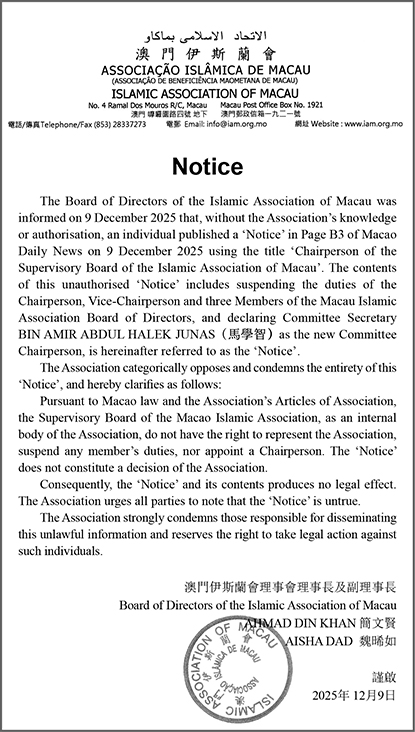Secretary for Security Wong Sio Chak said yesterday that the police have discovered online photos parodying Monday’s incident of a Customs officer having mistakenly raised the national flag upside down, adding that those responsible for the photos would be investigated in accordance with the local law on the national flag.
Wong made the remarks on the sidelines of a graduation ceremony at the Macau Security Forces Academy in Coloane.
An officer of the Macau Customs Service raised the national flag upside down on the Outer Harbour Ferry Terminal at 7:10 a.m. on Monday, but the mistake was not rectified until 12:10 p.m., according to media reports on that day.
Wong said the mistake was “unacceptable under any circumstances”, adding that disciplinary proceedings against the officer have
commenced.
Macau Customs Service Director-General Alex Vong Iao Lek, who also attended yesterday’s ceremony, said he felt regret about
the mistake and would reinforce his officers’ training.
When asked whether it was raining heavily when the flag was raised upside down, Vong said that there was a thunderstorm at the time.
Photos of the national flag raised upside down circulated on the Internet on Monday. According to Wong, some netizens have created pictures by cropping photos of the flag raised upside down on the ferry terminal and then pasting them onto pictures taken of other locations.
“Not only is this an insult to the national flag, but also to the Customs Service,” Wong said.
According to Wong, the creators of the parody photos may have violated the national flag law as their modus operandi was “clearly intentional” and “fabricated”.
The Macau Basic Law’s Annex 3 lists a total of 11 national laws which are applied in the Macau Special Administrative Region (MSAR), including the Law on the National Flag of the People’s Republic of China (PRC).
Local Law 5/1999, which came into force on the establishment day of the MSAR on 20 December, 1999, also regulates the use of national symbols in Macau.
According to Article 9 of the local law, blatant insults to a national symbol are punishable by up to three years behind bars.
Meanwhile, when asked about his decision to place the Judiciary Police (PJ) officer who abused his dog in public view in January on suspension, Wong said it was “definitely not a light punishment”.
The officer, surnamed Chan, was filmed by someone kicking, beating and throwing the dog around on the verandah of a residential building in Taipa in January 17. The video quickly went viral on various social media such as Facebook. Government- owned broadcaster TDM also aired the video.
Chan revealed himself to the public by posting a video on Facebook apologising two days after the incident. However, the abuser has taken legal action against local animal protection group Anima President Albano Martins for sharing the footage on social media. Wong declined to reveal the duration of Chan’s suspension. “The decision is not yet final. The officer still has the right to appeal,” he pointed out. When asked whether the Security Forces’ public image would be affected if Chan was to be allowed to resume his post after suspension, Wong said penalties in disciplinary proceedings are imposed strictly according to the law. “We cannot discharge an officer simply for their negative influence on the Security Forces’ image,” said Wong.

Secretary for Security Wong Sio Chak (front, centre), accompanied by Macau Customs Service Director-General Alex Vong Iao Lek (front, right) and other senior law enforcement officials, speaks to reporters at the Macau Security Forces Academy in Coloane yesterday. Photo: Annie Cheung









